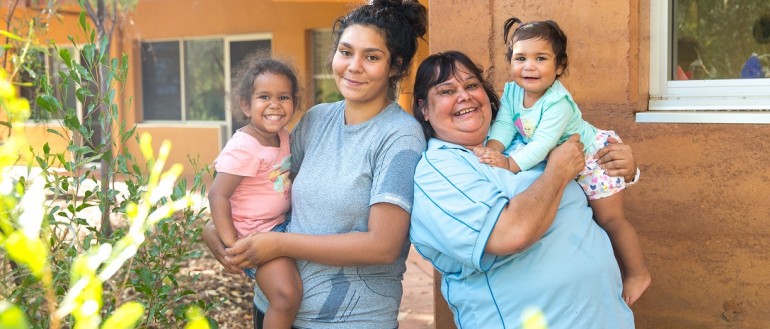Menzies research has shown very high rates of diabetes among Aboriginal and Torres Strait Islander Australians. Of particular concern is that this epidemic is intergenerational.
Our research in the Northern Territory (NT) is showing that there are increasing numbers of women with diabetes in pregnancy. Children exposed to diabetes in-utero are more likely have a number of health risks (including developing type 2 diabetes early in life) when compared to children not exposed to diabetes in-utero. Our research results are similar to other research findings in countries with similar histories of colonisation of Indigenous peoples.
We are now seeing young children being diagnosed with type 2 diabetes. Our work aims to address this intergenerational cycle in Aboriginal and Torres Strait Islander people, with a focus on early-life prevention: pre-conception, pregnancy and childhood.
The DIABETES across the LIFECOURSE: Northern Australia Partnership commenced initially in the Northern Territory (NT) in 2011. The partnership is between researchers, policy makers and health service providers. It aims to improve systems of care and services for people with diabetes in remote northern Australia. The Partnership includes work to improve the care and outcomes for Aboriginal and Torres Strait Islander youth with diabetes and women with diabetes in pregnancy and their babies.
After starting in 2011 as the NT DIP Partnership, further funding in 2015 enabled development of an alliance with Far North Queensland (NT & FNQ Diabetes in Pregnancy Partnership) and collaborating with Canadian researchers.
Early 2019 saw the change of the Partnership name to DIABETES across the LIFECOURSE: Northern Australia Partnership. This was to encompass the movement of the program from mothers in pregnancy, to including a focus on: children born to mothers with diabetes in pregnancy, diabetes prevention in children, and Aboriginal and Torres Strait Islander youth with type 2 diabetes.
**NB: Dotted lines represent projects with pilot funding only and/or not yet funded
Diabetes in pregnancy (DIP) is associated with an increase in short-term and long-term health risks for mothers and their babies. It also provides a unique opportunity to improve the future health outcomes of women and their babies.
Our research impact:
- Has supported the response to intergenerational diabetes by building the responsiveness and health system capacity and further defining research priorities;
- Improved identification of diabetes in pregnancy among women at high risk of diabetes in pregnancy (80% increase in the NT); enhancing early screening practices (20% increase in earlier diabetes in pregnancy diagnosis) and improving data about diabetes in pregnancy, including maternal/baby’s outcomes (through implementation of the NT and FNQ Diabetes in Pregnancy Clinical Registers and Models of Care activities)
- Directly influenced national and state/territory policy including: the Australasian Diabetes in Pregnancy Society’s audit policies, the National Diabetes Strategy and the priorities of the Northern Territory Diabetes Network
- Been translated into clinical guidelines ensuring that clinicians are cognisant of factors relating to intergenerational diabetes (including the first CARPA guidelines relating to type 2 diabetes in children) and the remote context.

